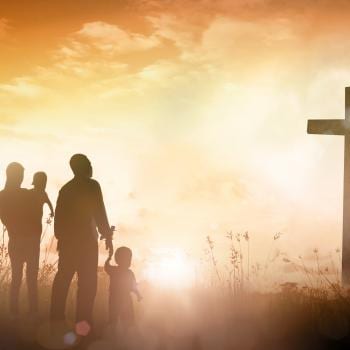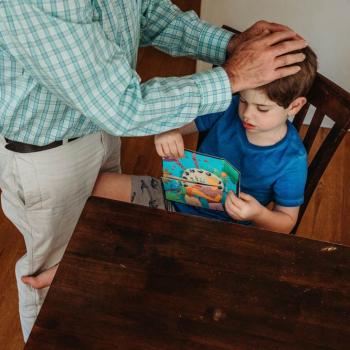Guest post by Dave McClow, Pastoral Solutions Institute
Men are more wired to assess threats than women; maybe that is partly why the disciples hid in fear behind locked doors after Jesus’ crucifixion (see John 20:19-23). Fear perceives the other as the enemy. Fear underlies all sin—any attack on the dignity of the human person. It becomes a problem when we fear the wrong people—like our spouses and kids. It is not a new problem, since it dates back to the Garden of Eden and the Fall. In fear, Adam and Eve covered themselves when they understood they could take advantage of each other, and they hid from God in the bushes.
Because God is love, we are a religion of love, as demonstrated by the greatest commandment and a new commandment. Fear is the opposite of love: “There is no fear in love. Perfect love drives out fear” (1 John 4:18). “Be not afraid” is a thread running throughout Scripture. And it was a motto, of sorts, of St. John Paul II.
The Locked Doors of Our Hearts
The disciples lived in fear of the Jews, having locked the doors, and it was evening…isn’t this usually when our fears come out? When we feel fear, we often lock the doors of our hearts, even to loving people, including Jesus. So what hides behind the locked doors of your hearts?
Jesus appears to the disciples behind those locked doors. He starts with “Peace be with you,” showing them his hands and side. I am sure he does this to identify himself; but beyond that, he leads with his wounds. This is an interesting leadership style, worthy of reflection in a culture that peddles “Never let them see you sweat.” This motto, ironically, is a perpetual prescription to live in fear of exposure and…to sweat!
Jesus never imposes himself on us. So we must invite him behind those locked doors of our hearts, where everything is bound and loosed (CCC 2843), into the ugliness where our fears, wounds, and sins have reigned. For many men, this ugliness is the sin of pornography. Fear and shame keep us from inviting him in. Satan is the Accuser, but he transfers this job to us, and we tend to cooperate by accusing ourselves! The Devil’s name means “to separate,” especially from God and others; and separation results from self-accusation. Freedom is found only in God’s presence.
How Does Jesus Come?
Once invited, Jesus does not come as a King to judge in power, but as the King who heals—the wounded healer who leads with his wounds. He comes as Priest to link our fearful hearts to his Father of love, or to Love’s second name, Mercy. He comes as Prophet not to speak harsh words in love, but to speak the truth of Love Itself to the lies of our fearful hearts.
I imagine him entering my heart, absorbing my fears, pain, and darkness into the wounds in his hands. But it is not enough to “sweep the house clean,” leaving it vulnerable; it must be filled! So I imagine the wound in his side that gushed forth the water and blood of our Baptism and the Eucharist, pouring forth his love and mercy, filling the empty space with the fullness of God (cf. Eph. 3:14-21)! Sometimes I don’t even know what his wounds are absorbing; I just know I calm down and am no longer fearful, and I feel grateful. And I rejoice as the disciples do!
Loved and Now Challenged!
But he is not done! He continues, “Peace be with you.” Each time, I understand this more. Then he stuns with, “As the Father has sent me, so I send you.” It means we must receive God’s love, as Jesus does—the Father gives himself totally, without reservation, to his Son, an echo of which is heard when the prodigal’s father tells his older son, “Everything I have is yours.” We are loved first, now challenged. We must work from love, never for love.
Jesus is sent as priest, prophet, and king, so we are sent as priest, prophet, and king. We are baptized and made gods—not just adopted, but made sons of the Father through a nature change. Then we are strengthened with other sacraments.
He is still not done! In his overwhelming generosity, Jesus breathes on them, saying, “Receive the Holy Spirit”—Love himself. Of course the apostles receive a special authority to bind and loose here, but we are also given the Holy Spirit and must receive him to fulfill the challenge of love!
We fear being unlovable in our sins. So the Father sends his Son in love as priest, prophet, and king. We must invite him behind the locked doors of our hearts into those shame-filled rooms. By his wounds, he leads and heals us to receive his peace. Then he sends us out with the Holy Spirit as priest, prophet, and king to love others as spiritual fathers! “As the Father has sent me, so I send you.”













